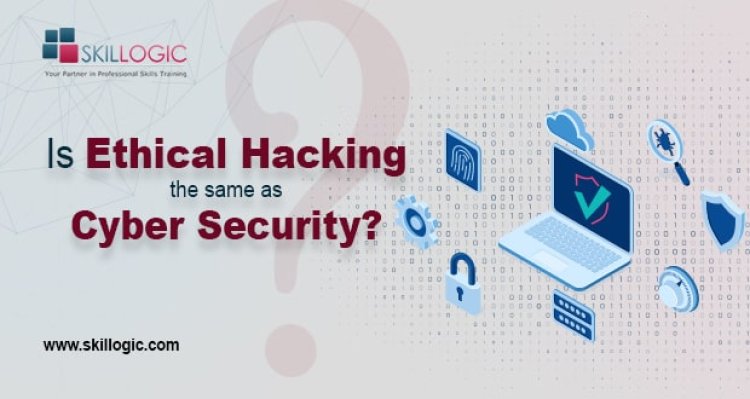Is Ethical Hacking the same as Cyber Security?

According to the security magazine, approximately 2,200 cyber-attacks occur every day, implying that at least one attack occurs every 39 seconds!
The number of cyberattacks in the world is increasing at a faster rate than ever before, thanks to technological improvements.
Two of the most in-demand careers in the computer industry are ethical hacking and cyber security. People frequently confuse the two terms, and while they are related, they are not interchangeable. While cyber security is a broad subject, ethical hacking is a subset of it.
What is Cyber Security
A practice or a procedure that protects networks, computers, and data from injury, hostile assaults, and unauthorised access is known as cyber security. It’s a set of skills and procedures for defending users’ data, devices, and programmes against cyber-attacks.
Cyber security is inevitable as it encompasses everything that has to do with safeguarding our data from cyber attackers who wish to steal it and use it for malicious purposes.
- Network security
- Information security
- Data Security
- Application Security
- Cloud Security
- Identity Management
- Mobile Security
- Endpoint Security
Know How to become Cyber Security Expert in 2022?
Duties and responsibilities of a cyber security professional:
A cyber security specialist is in charge of a wide range of tasks. Some of the most typical duties and responsibilities of a cyber security professional are as follows:
- Identifying the most effective techniques to secure data, systems, and networks against cyber-attacks
- Improving the security system by implementing the most efficient technologies
- Vulnerability checks and security assessments
- Supervising and guiding security teams
- Keeping the security system up to date is essential.
A Cyber Security Engineer earns an average of $97,805 a year! – Payscale.com
Watch this video: Biggest Cyber Attacks in the World
What is Ethical Hacking
Ethical hacking is a type of cyber security that is defined as the act of evaluating a system for all conceivable security flaws and repairing any vulnerabilities before a harmful assault occurs. Hacking is against the law, however, ethical hacking is the legal technique of circumventing system security in order to detect any potential data hazard. Ethical hackers set out to investigate systems conducive to identifying weak points that malevolent hackers can manipulate.
Ethical hackers do not try to damage anyone with their acts and instead seek to secure their own systems.
Know The Disparity between Ethical and Unethical Hacking?
Duties of an Ethical Hacker:
- Evaluate the system’s performance.
- Perform a security system test.
- Make recommendations for ways to improve the security system.
- Notify the organisation if there has been a harmful attack.
- Look for flaws in the security system.
- Use hacking techniques that are acceptable.
It, too, falls under the umbrella of cyber security, but it entails a single task: testing and putting a security system to the test against all conceivable weaknesses.
The purpose is to simulate the steps a malicious hacker would take to get access to a system and confirm that the security protocols are strong enough to survive such attacks. Ethical hacking frequently exposes key security gaps, resulting in better preparedness for any situation.
As reported by Salary.com, the average Ethical Hacker salary in the United States is $102,220!
Difference between Cyber Security & Ethical Hacking
Cyber Security:
- Wide-ranging security techniques are included in the broad domain.
- It entails securing systems by identifying and resolving cyber security concerns.
- This chapter discusses how systems can be safeguarded.
- Taking a defensive posture
- Security Architect, Security Consultant, Penetration Tester, Security Analyst, Security Engineer, CISO, Information Security Analyst are just a few of the job titles available.
Ethical Hacking:
- Ethical hacking is a wing of cyber security.
- It entails locating system flaws and attempting to close them at all costs.
- It’s about how to break into computers.
- Works from the perspective of a hacker
- An offensive approach
- Information Security Analyst, Certified Ethical Hacker, Security Consultant, and Penetration Tester are examples of job roles.
According to Gartner, organisations will spend more than $123 billion on security in 2020, and this figure is likely to rise to $170.4 billion by 2022.
Know How Much Does It Cost to Learn Ethical Hacking in 2022?
How can cyber-attacks be avoided?
- Keep strong passwords on hand.
- Make sure your software is up to date and don’t click on any needless weblinks.
- Make a backup of your data.
- Configure the firewall
- Activate spam filters.
- Access to your systems can be restricted.
With the rise of cyber-threats, it’s become more important than ever to protect sensitive information and data from prying eyes. This demonstrates why ethical hacking and cyber security are in such high demand in today’s world. With increased demand, there is a greater need for bright and skilled employees to meet it.
CompTIA, IIFIS and EC-Council have accredited SKILLOGIC Cyber Security and Ethical Hacking Courses. The certification attests to your ability and knowledge in the field of cyber security and Ethical Hacking.

0
8858